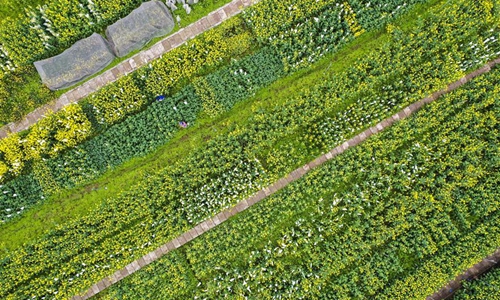Uncertainty over imports weighs on domestic rapeseed market
By Yang Kunyi Source: Global Times Published: 2020/7/21 13:10:29

Aerial photo shows people working at a test field of Chongqing engineering research center of rapeseed in Chongqing, southwest China, March 5, 2020. Agricultural experts and students at the research center make a research work as the rapeseeds here enter the flower season. Photo:Xinhua
China's rapeseed oil price has been soaring for three straight months and has reached the highest level in seven years, amid import uncertainties including tension with Canada and Australia, China's biggest rapeseed trade partners.
The rapeseed oil price broke the 8,000 yuan ($1,144) threshold on Friday, hitting 8,627 yuan per ton. This follows an upward trend for the past three months, with the price spiking 14.54 percent from 7,532 yuan per ton on April 17.
The main reason is the increasing uncertainties over China's import relationship with Canada and Australia, the two biggest sources of imported rapeseed in China, according to industry insiders.
Jiao Shanwei, editor-in-chief of cngrain.com, a website specializing in grain news, told the Global Times that Chinese imports of rapeseed have been dwindling since June, following a Canadian court's ruling that the extradition case against Huawei CFO Meng Wanzhou can proceed.
"The market is concerned about future trade relations and potential retaliation in the wake of the ruling," Jiao said, "and both rapeseed spot and futures prices have been on the rise."
According to Jiao, the biggest importers of Canadian rapeseed include China Grain Reserves Group and China Oil and Foodstuffs Corporation, both of which may have halted importing rapeseed from Canada since July. Neither company responded when contacted by the Global Times on Monday.
Imports of rapeseed from Canada have been subject to policy restrictions since March last year when China halted imports from Canada's top exporters after claims of pest infection in the rapeseed crop.
According to statistics from the General Administration of China (GAC), the total imports of rapeseed from Canada registered more than 185,572 tons in April, down 31.26 percent year-on-year. Imports from Australia were also down 20.87 percent from March to 40,947 tons.
The tightening of imports and grim market expectations over bilateral trade are also coinciding with a surge in demand in the second half of the year as restaurants resume business, keeping the rapeseed price elevated at least till the end of this year.
"China has by and large contained the COVID-19 crisis domestically and has begun to tentatively open up entertainment and catering industries," said Ma Wenfeng, a senior analyst at Beijing Orient Agribusiness Consultancy.
For the second half of this year, other major oil crops, including soybeans and palm, will also see their prices lifted under the influence of tightened rapeseed imports and rising rapeseed prices, Jiao said.
Posted in: MARKETS